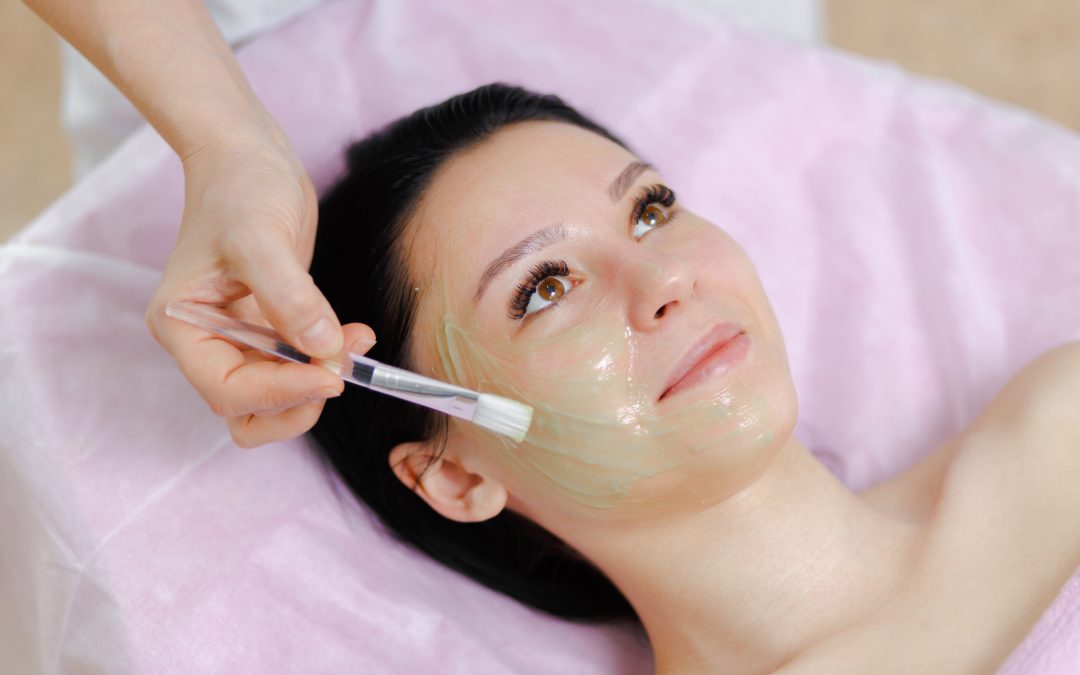A chemical peel is a cosmetic procedure that involves the application of a chemical solution to the skin with the goal of exfoliating the outermost layers. This process results in the removal of dead skin cells, encouraging cell turnover and promoting the regeneration of new, healthier skin. Chemical peels can be used to address various skin concerns and improve the overall texture and appearance of the skin.
Here are key aspects of chemical peels:
Types of Chemical Peels:
-
-
Superficial Peels
These peels use mild acids (such as alpha hydroxy acids) to exfoliate only the outer layer of the skin. They are suitable for addressing mild skin imperfections and require minimal downtime.
-
-
-
Medium Peels:
Medium-depth peels typically involve the use of trichloroacetic acid (TCA) and penetrate deeper into the skin. They are effective in treating moderate skin issues like wrinkles, fine lines, and uneven pigmentation.
-
Deep Peels:
These peels, often using phenol, penetrate the deeper layers of the skin. They are reserved for more severe skin concerns, such as deep wrinkles and scars. Deep peels require a longer recovery period.
How Chemical Peels Work:
The chemical solution applied during a peel induces controlled damage to the skin, prompting the body’s natural healing process.
As the damaged outer layers peel away, new skin cells are revealed, leading to a smoother and more even complexion.The depth of the peel determines the extent of skin penetration and the specific skin concerns addressed.
-
Common Uses of Chemical Peels:
Improving Skin Texture: Chemical peels help in reducing roughness and promoting a smoother skin texture.
Addressing Fine Lines and Wrinkles: Peels can diminish the appearance of fine lines and wrinkles, particularly with medium and deep peels.
Reducing Hyperpigmentation: Chemical peels can lighten areas of hyperpigmentation, including sunspots and age spots.
Treating Acne and Acne Scars: Peels may help in reducing acne breakouts and improving the appearance of acne scars.
Evening Skin Tone: Chemical peels can contribute to a more even skin tone by addressing issues like melasma and uneven pigmentation.
The Procedure:
A chemical peel is typically performed by a trained skincare professional or dermatologist.
The skin is cleansed, and the chemical solution is applied evenly to the targeted area.
During the procedure, individuals may experience a tingling or burning sensation, which is usually temporary.
The solution is left on the skin for a specific duration, and then it is neutralized or washed off.
Recovery and Aftercare:
The recovery time depends on the depth of the peel. Superficial peels may have minimal downtime, while deeper peels may require a week or more of recovery.
Post-treatment care often includes the use of moisturizers, avoiding sun exposure, and following specific instructions provided by the skincare professional.
It’s crucial to note that chemical peels are not one-size-fits-all, and the appropriate type of peel for an individual depends on their skin type, concerns, and desired outcomes. Consulting with a qualified skincare professional is essential to determine the most suitable approach for an individual’s specific needs.
Frequently Asked Questions:
How does a chemical peel work?
Answer: The chemical solution applied during a peel causes the outer layer of the skin to peel off, leading to the regeneration of new skin cells and improved skin appearance.
What skin concerns can chemical peels address?
Answer: Chemical peels can address concerns such as fine lines, wrinkles, acne scars, uneven skin tone, and sun damage.
Are there different types of chemical peels?
Answer: Yes, there are superficial, medium, and deep chemical peels, each with varying degrees of penetration and intensity.
Who is a good candidate for a chemical peel?
Answer: Individuals with concerns like sun damage, acne scars, and fine lines can be good candidates. A consultation with a skincare professional is recommended.
Is a chemical peel painful?
Answer: Sensations during a chemical peel can vary. Superficial peels may cause mild tingling, while deeper peels may involve a more intense sensation.
How long does a chemical peel procedure take?
Answer: The duration depends on the type of peel. Superficial peels can take about 30 minutes, while deeper peels may take longer.
What is the downtime after a chemical peel?
Answer: Downtime varies depending on the peel’s depth. Superficial peels may have minimal downtime, while deeper peels may require more recovery time.
Can I wear makeup after a chemical peel?
Answer: Makeup is usually avoided immediately after a peel, and the timing for its application depends on the depth of the peel.
How many sessions are needed for visible results?
Answer: The number of sessions required depends on the specific skin concerns and the type of peel used. Multiple sessions may be recommended for optimal results.
Can chemical peels be performed on all skin types?
Answer: Chemical peels can be adapted for various skin types, but the suitability is assessed during a consultation.
Can chemical peels be used to treat acne?
Answer: Yes, chemical peels can help address acne and acne scars by promoting exfoliation and improving skin texture.
What precautions should be taken before a chemical peel?
Answer: Patients may be advised to avoid sun exposure, discontinue certain skincare products, and inform the practitioner of any medications they are taking.
Are chemical peels safe?
Answer: When performed by a trained and experienced professional, chemical peels are generally considered safe. Side effects are usually mild and temporary.
How soon can one see results after a chemical peel?
Answer: Results can vary, but improvements are often visible within a week or two after the peel, with continued enhancement over time.
Before undergoing a chemical peel, individuals should have a consultation with a qualified skincare professional to discuss their specific concerns, expectations, and the most suitable type of peel for their skin.
Schedule Your Appointment:
If you are located in Cairns, Australia, and you are ready to achieve a radiant, glowing skin, contact us today to book your appointment. Call us or use our online form to get in touch with NUYU Skin and Body today.


